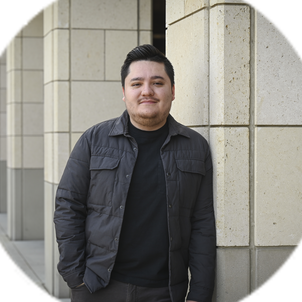Right now I’m working with collaborators at UCLA to study the mechanics of the beating heart. I analyze videos of that process to build computational models that help us understand the heart’s geometry and how it inflates. That information can be used to estimate the heart’s material properties.
Biologists already know a lot about how altering genes and using various medications can lead to abnormalities of the heart. The work I’m doing could add a piece to this knowledge by helping us understand how these drugs or gene therapies actually affect the tissue of the heart by making it thicker or thinner, or more or less elastic, potentially influencing the disease process.
I enjoy what I’m doing now, but I nearly dropped out of the PhD program last summer. I could handle the classes, but the research aspect was less structured than I was accustomed to, and I struggled with that. In mechanical engineering, you’re expected to do research rotations in different labs to find one where you like the work and where you have a good fit. I rotated in two labs that weren’t a good match, then landed in another that seemed to better merge with my interests and skills. I was there for about a year, but at some point I found I just wasn’t interested in the application of the research. I felt like I was slogging through the work, and I wasn’t enjoying it. I was doubting my abilities and wondering if grad school was right for me, calling friends and family every day to ask their opinions on what I should do.
Two weeks after I passed my qualifying exams, I felt I didn’t want to be in grad school anymore, so I reached out to my academic advisor, Professor Ali Mani. He helped me talk through the issues I was having, and after several conversations he recommended I try a rotation in the Marsden lab. I decided to do that before making a final decision. I began enjoying the work; the project had more variety and was more applied, it better matched my skill set and interests, and there were rewarding milestones along the way. I better understood what I needed to do to succeed, and that was really motivating.
Today I’m still in graduate school, and enjoying what I’m doing. Feeling discouraged is part of the PhD experience, and it can be difficult to tell if your current struggle is something you simply need to work through or represents a fundamental mismatch between you and your topic, environment, or mentor. That’s why it’s important to seek advice from everyone you can and try out as many things as possible. If you decide you really don’t fit in your current situation, be confident that there’s better path for you. You just have to find it.
Related spotlights

Adrienne Propp

Lara Weed

